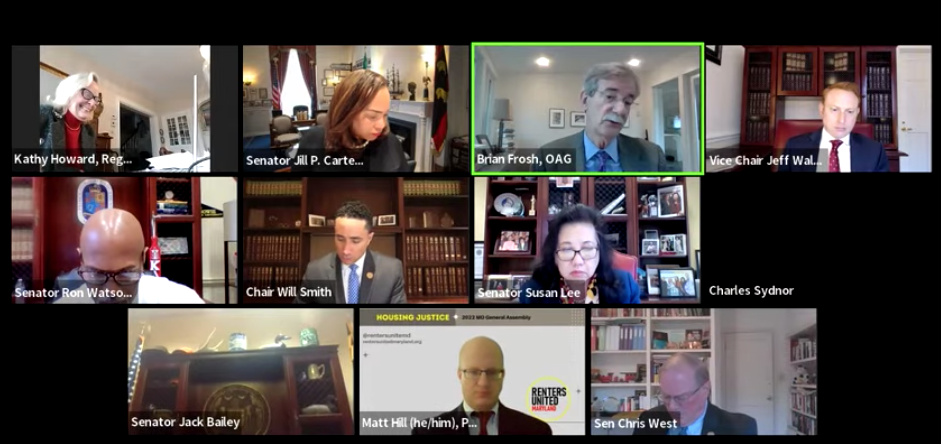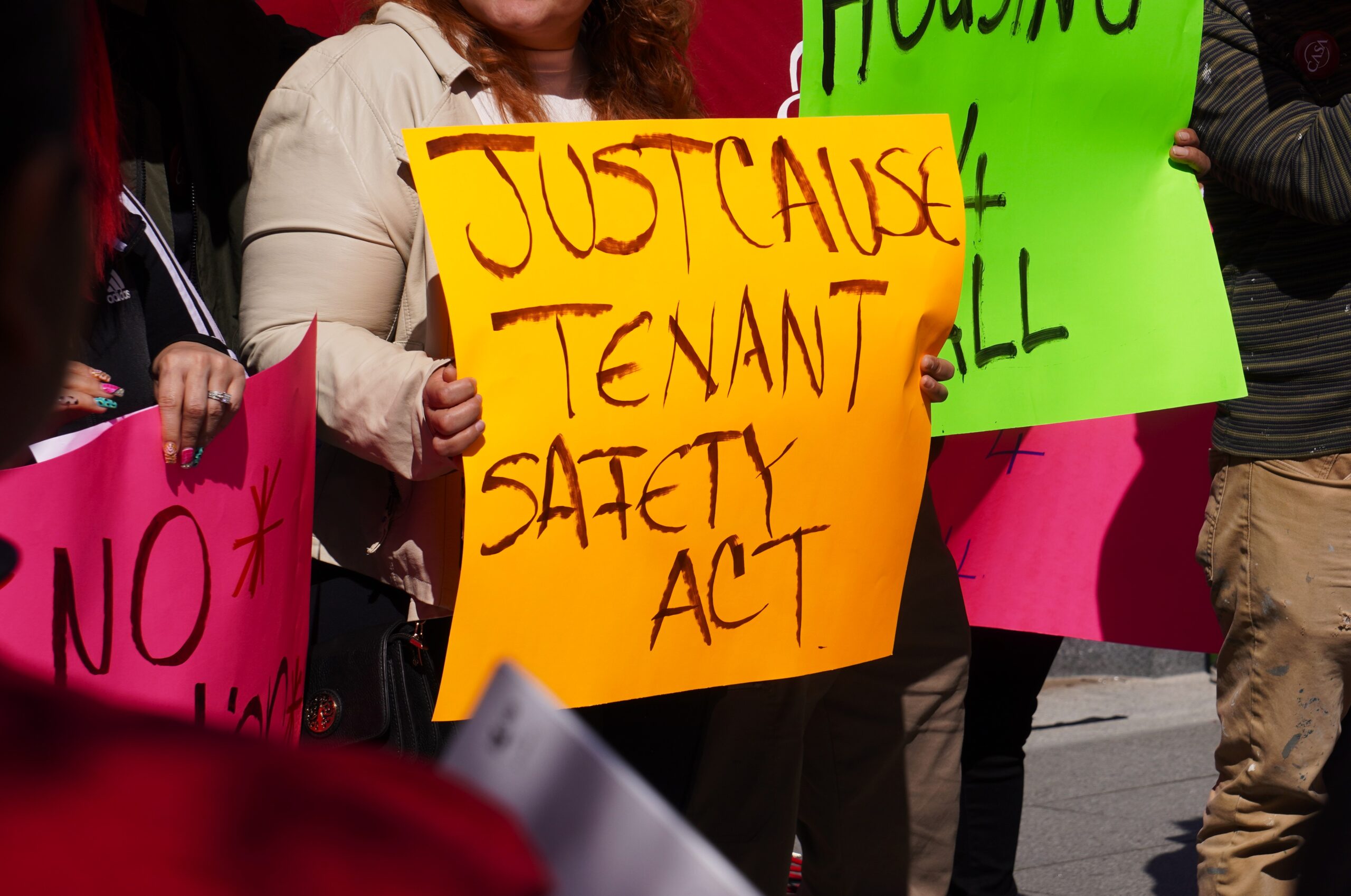Frosh Urges Lawmakers to Raise Eviction Filing Fees

Maryland has lower eviction filing fees than surrounding states — and Attorney General Brian E. Frosh wants lawmakers to raise those fees to deter “serial eviction filings” in the state.
Senate Bill 223, sponsored by Senate President Bill Ferguson (D-Baltimore City) on behalf of Frosh (D), would raise eviction filing fees and summary ejectment surcharges. The bill would increase surcharges associated with filing an eviction to $73 from $8 in failure to pay rent cases and to $73 from $18 in other types of eviction cases.
Frosh told members of the Senate Judicial Proceedings Committee on Thursday that Maryland has a higher eviction filing rate — and lower filing fees — than other states. While eviction filing fees are $112 on average nationwide, that figure is $15 statewide and $25 in Baltimore City for failure to pay rent cases, including the $8 surcharge that would be affected by the bill.
“We have one of the lowest eviction filing fees in the nation,” Frosh said.
Frosh said that low eviction filing fee has led to “serial eviction filings,” or multiple filings against the same tenant in a single year. Surrounding states with higher filing fees have much lower eviction filing rates than Maryland, he said.
Between April 2020 and November of 2021, Frosh said that Pennsylvania had 89,269 filings, Virginia had 72,485 filings and Delaware had 11,323 filings. During that period Maryland had 488,492 filings, even amid court shutdowns, federal rental relief funding and emergency protections for tenants.
“We had five and a half times the filings that Pennsylvania did during the same period,” Frosh said, noting that Pennsylvania has roughly 13 million residents, more than double the population of Maryland. “That shouldn’t be happening.”
Funding from eviction surcharges go to the Maryland Legal Services Corporation, the state’s largest funder of civil legal aid.
In addition to raising the eviction filing fee, SB 223 would prevent tenants from being required to pay for the surcharge.
Sen. Ronald L. Watson (D-Prince George’s) pushed back on the bill, and said he is concerned that the bill would hurt small landlords who only own a few properties. Frosh said the bill would simply work as a deterrent to landlords who file for eviction immediately as a means of recovering rent.
“Landlords in other states are making money,” Frosh said, “And yet they’re filing at a fifteenth of the rate that we do.”
Watson also took issue with the bill’s provisions that prevent the eviction filing fee from being passed onto tenants. He said he had been a landlord but was “driven out of the market because of the continuing challenges of going to court and trying to collect.”
“If we have to go to court, if a tenant is being provided legal counsel, if there’s going to be more cost associated with the landlords, and the landlord wins, at a minimum the court costs should be covered,” Watson said.
Grason Wiggins, senior manager for government affairs for the Maryland Multi-Housing Association which lobbies for landlords, opposed the bill’s provisions that don’t let the landlords recover the surcharge from tenants. He said that neighboring states with higher filing fees allow landlords to recover those fees.
Wiggins also argued that, since lawmakers passed a law last year that requires landlords to give a 10-day notice on an eviction filing, the legislation isn’t necessary to curb serial evictions.
“That bill solves that problem,” Wiggins said.
Matt Hill, an attorney with the Public Justice Center, said his organization supports the bill, but would oppose it if it allowed the higher filing fee to be passed onto tenants.
“The way to do this does not lie in passing that fee onto tenants who are already struggling to avoid eviction,” Hill said.
Hill said passing the fee on to tenants would make it harder for them to exercise their right to redeem, which allows them to stay if they pay the full judgment before they are evicted. Adding the fee would make it harder for them to pay that amount, Hill said.
Hill also said allowing landlords to recover the increased surcharge from tenants would defeat the bill’s aim to curb serial eviction filings.
Katie Davis, director of the Pro Bono Resource Center of Maryland’s Courtroom Advocacy Project, also said her organization would oppose the bill if the raised surcharge could be passed on to tenants. She noted that the Pro Bono Resource Center of Maryland is among the organizations funded by the Maryland Legal Services Corporation, which gets proceeds from the surcharge.
“Even though PBRC could stand to gain some additional funds, if these funds openly come from the very tenants we’re trying to serve, then we’re creating more of a problem than we’re solving,” Davis said.
Reena Shah, executive director of the Maryland Access to Justice Commission, said cutting back on eviction filings would also decrease costs for the state’s access-to-counsel-in-eviction efforts, which state lawmakers approved last year. Legislators are now mulling ways to fund that initiative, including using federal rent relief funds or raising court fees.
“As we’re trying to figure out how to implement the access to counsel in evictions law, the funding for that program will obviously increase in relation to the amount of filings there are, because all of those cases have to be looked at and reviewed,” Shah said.
Erin Bradley, vice president of Maryland government affairs with the Apartment and Office Building Association of Metropolitan Washington, took issue with raising the surcharge for eviction cases other than failure to pay rent. Bradley called the proposed fee increase a “punitive tax” on landlords.
In Maryland, landlords can file for eviction under four situations: failure to pay rent; tenant holding over, which can occur when a tenant remains on a property after a lease expires; breach of lease; and wrongful detainer, which can occur when someone who isn’t on a lease is staying at a property. Tenant-holding-over filings saw an uptick during the pandemic after they weren’t covered under federal and state eviction protections.
Advocates for tenants said that, even if rent is paid and an eviction case is dismissed, having a filing on record can hurt a tenant’s future housing prospects.
“Landlords don’t often make a huge distinction between whether that eviction actually was carried out by the sheriff or whether it was just an eviction filing,” said Eva Rosen, an assistant professor at Georgetown University’s McCourt School of Public Policy whose research has focused on social inequality. “And so having these marks on their residential records is really, really detrimental for tenants, to their ability to find stable and affordable housing in the future.”




 Creative Commons Attribution
Creative Commons Attribution